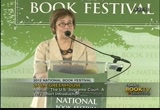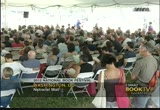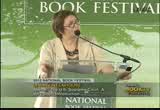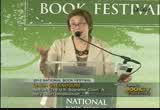tv Book TV CSPAN November 22, 2012 9:00pm-9:45pm EST
9:01 pm
i will take this as a testament to how people are interested in the court, not necessarily in may. me. maybe i should start off by orienting people to let this little book is. it's part of a series called a very short introduction and they are really short. they have about 300 titles and they asked me to do a supreme court titled. i guess it was about three years ago in the book came out this spring. it came out really on the eve of the health care position, so who knew three years ago that we would be faced with the supreme court dealing with the most closely watched and maybe the most contentious case and many many years and i would be happy, of course in the book doesn't say anything about the health care so in the q&a i would be happy to share some conversation about that with you. i thought i would just kind of step back and give a little bit of my take on how the court has
9:02 pm
gotten to where it is, not so much current events but really looking back. the book starts with a little history. it's not a book of history. i am not a historian. i am a court watcher is what i think of myself as, but one thing that is so interesting about the court when you kind of step back and look at it is the extent to which the court has really written its own story. it's the author of its own story. by which i mean that article iii of the constitution set up several court systems, really says -- tells us nothing prior to a roadmap. it simply says the judicial power of the united states shall be vested in one supreme court and such inferior courts as congress may from time to time regain and establish and that's it. so they article iii, the judiciary article doesn't even mention the chief justice. we know by inference that there
9:03 pm
is such an office as chief justice because elsewhere in the constitution we are told that when the president is impeached and tried by the senate, the chief justice shall preside over the summit trial. if you remember chief justice rehnquist presiding over the impeachment trial of go clinton. but what the chief justice's role is and effective in how the chief justice is appointed. you know in the federal circuit court, the courts of appeals, he become the chief judge by seniority so maybe one could have become a chief justice by seniority, but now. resident george washington thought otherwise and actually nominated justice john jay in that case by separate commission and so that established the pattern that someone gets nominated to be chief justice up through the ranks and beyond that, to have -- how the court
9:04 pm
operates and what it conceives as jurisdiction. for for instance many high courts around the world can give what we would call advisory opinions to the executive branch of their government or their legislative branch can say you know if we did such and such a thing when it passed muster and they would say yes or no and if the answer is no they would go back and redo it and bring it back again in a kind of works that way. are court very early on established that it was not issued by jury opinions. there had to be an actual case or controversy, and at first dealing between two or more parties before the court would take would take up the case and that was really quite important in terms of how our law developed in a relationship between the judicial review, the ability of the court to examine an act of kindness and strike it down as unconstitutional. we take it for granted, the
9:05 pm
modern court has done that with some frequency and of course was asked to do it this spring in the health care case. well, you know john marshall famously declared that it was the power and the duty of the court to say what the law is and that was the expression of his understanding, but the power of judicial review is inherent in our constitutional system and that was not self-evident at all. so that is the power of jurisdiction. limits on jurisdiction that somebody has to have standing and all the doctrines that limits jurisdiction, that is not something the court basically made up another courts don't necessarily have that. a few years ago i took a very interesting judicial trip to south africa which have the fabulous constitution, modern constitution and a wonderful supreme court. the south african constitution gives the south african people all kinds of positive rights,
9:06 pm
right to housing for my right to education, a right to health, a right to a job. our constitution of course doesn't. our constitution has negative rights. the government shall not -- shall not, shall not, shall not, the negative rights against the power of the government and in south africa they have powerful -- positive rights and there is no limitation on jurisdiction. somebody can come into court and say you know, the constitution promises me a job and i don't have a job? and what do you judge is going to do about that? on one hand it's very wonderful not to have these barriers. on the other hand it's quite a problem for a court because the court cannot actually effect giving that person a job and so it is left in a situation where there are lots of promises that have been given that the courts can't fulfill so there is a gap that has grown in expectations
9:07 pm
and failed promises. maybe john marshall in our early justices saw around the corner, i don't know, but they decided early on that there were going to be barriers to entry to the courts. so the one last kind of stark point i would like to bring to your attention is the modern supreme court sets its own agenda and that is really important. it's really important and an overlooked aspect of how the court behaves in terms of judicial behavior and how the court interacts with the rest of government and the rest of american society. most courts, the federal courts of appeal and courts that people are familiar with have to take what comes. that was true of the supreme court for quite a long time. the supreme court is basically a court, the high court of error correction that somebody can persuade the court that something went amiss in the
9:08 pm
lower court judgment. the court would have to take that case and would have to make some kind decision but in 1925, chief justice howard taft, who first had been president, the only president ever to become chief justice -- he was a very savvy player of judicial and other kinds of politics, persuaded congress to change that in 1925. a piece of legislation commonly known as the judges bill gave accorded great deal of discretion over its docket and that discretion has grown both by statute and by practice in the intervening decades. and so today, we have a court that receives about 8000 requests for review. they are known as petitions for certiorari every term and from that 8000 we take about 80 of the grants of review resource and the court deploys it very
9:09 pm
scarcely, and also in a way that you might say reflects the judgment of the justices as to what needs deciding by them. so for example, a case that is going to be heard a week after the court reconvenes next month, october for the new term, a case called fisher against the university of texas is a challenge to affirmative action in higher education admissions. you may remember back in 2003 the court had a major case on the subject from the university of michigan and upheld affirmative action with an opinion by justices sandra day o'connor which concluded by saying the country has about 25 years to figure this out and we are not going to get that for 25 years. she said in the message well, 2003 is not quite 25 years but
9:10 pm
it only takes four justices to vote to hear a case and there are four justices who evidently think that it's time to get back into this. you probably haven't heard much about this case yet, because their airwaves in terms of the supreme court have been so filled with health care but once term begins in the case is going to be argued on october 10, you will start hearing a whole lot about affirmative action and the debate will be rehearsed all over again. so the courts ability to sort of tell us what to think about in terms of the legal docket, the legal agenda is really very powerful and also what not to think about, the courts full range of issues that the cordesman get into. it's now been more than five years since the court -- well, four years since the court decided the case coming out of the structure at guantánamo bay.
9:11 pm
we haven't heard much about that lately, so just a segue for a minute to health care. that health care case was an example i think not of the court engaging in that kind of agenda setting of affirmative action but the case of the health care, the federal court of the peers -- appeals head to clears the one thing that the court feels it has not the issue to do with a situation like that is to give the government a chance to defend an act of congress as a government and that in the lower court is declared unconstitutional. the defense of marriage act has been declared unconstitutional by a number of federal courts and appeals from those judgments are now before the supreme court, not brought by the government and obama administration believes that laws unconstitutional but wrought by the house of representatives which has the right to defend an act of congress that the president chooses not to defend. i think it's a sure bet that the court will undertake the defense
9:12 pm
of marriage act again because there are judgments in the lower court saying it's unconstitutional. so again, that is the agenda setting function and what we are going to be hearing about, debating and talking about and ultimately getting a decision. it really lies in the power of the court and a very major and i said under appreciated power. one question that it raises really is how did the justices know what's important? how do they know what they should be deciding? obviously when people bring their appeals to the spin court they lay out the case and the format of one of these petitions question presents what it is they want the court to decide. they have 30 pages to make their case. the court should hear them out.
9:13 pm
the justices live in the world and they don't live a sheltered lives that other government officials who exercise that kind of power that the justice would exercise have. they live in their own house and they drive themselves to work. we used to see justice o'connor and -- so they are out there but how do they know what they think they know? there is one rather recent example of a kind of a failure, and institutional failure of knowledge that i think is kind of interesting. four years ago there was a case before the court kennedy against louisiana and the question that came to him was whether a death penalty law that poses a death penalty on somebody who has raped but not ordered a child, so the death penalty for a non-murder offense is constitutional or whether that's cruel and unusual punishment.
9:14 pm
so the courts at this case and the court case amendment jurisprudence in similar cases such as the death penalty for people with retardation and they death penalty for people who committed murder as a juvenile. what the court believes is what is cruel and unusual and what is unusual? it looks at the different state statutes and decides what's unusual and then goes on to make a judgment. in the case of child rape without murder, just a handful of states have such a law on the books so justice kennedy wrote an opinion declaring this louisiana law unconstitutional and then of course in his opinion he said he now we have looked at the state laws and their only a handful of states that have this. the federal government doesn't have it and even though congress has revisited the federal criminal code, many times in recent years, it has never added
9:15 pm
child rape as a capital offense. but since then it has, but nobody had told the court. just a year before this decision, congress had added child rape as a capital offense in the uniform code of military justice, ucmj which is the legal code for the armed forces. nobody had brought it to the courts attention. the solicitor journal -- general who represents the federal government before the supreme court had not even filed a brief in the case. obviously when the case came up, nobody in the whole federal league for the government had any kind of stake in it whatsoever and i find out about it because of somebody i know who is a military lawyer that knew the law and had talked about it after the court had recessed for the summer. i called up the lawyer and the solicitor general's office to ask him about it.
9:16 pm
so i see you did not file a brief in louisiana. he said that's right. i said i guess that's because you had no federal interest in the case. he said the i that's right. suppose i told you that the usm -- ucmj included capital punishment for child rape and i cannot quote here in this audience -- the. [laughter] so in my final days as a daily reporter at the times are wrote a story about it and went through all kinds of hand wringing and louisiana asked the courts for a rehearing in the court took two weeks and so on and so on and they did not actually rehear the case. they reshoot the opinion with the same 5-4 with a footnote acknowledging oh by the way we take notice of this and it doesn't change her opinion so it doesn't add up to anything. i wanted to mention as an example of the limits of the supreme court's knowledge. they can't send people out into the field to save what is the real story behind this that or
9:17 pm
the other thing? they rely on the brief. and so when you see the court exercising the power to set the country's legal agenda it does kind of leave you scratching your head. how do they know what is important? one way they might know what's important is what they bring to the court from their own personal and professional background. when they get nominated and confirmed to the court and that's an interesting subject to quds the collective biography of the supreme court justices has changed a great deal over time. back in the old days for instance there was -- well in the old days they were were all partisan white men so we will take that as a given. nobody thought about how we think about it today but they did think about other kinds of diversity. for instance they taught -- thought a lot about geographic diversity. there always had to be a
9:18 pm
westerner on the court and so on and now we really don't think about that at all. most of the justices today are from the northeastern quadrant and we don't really think about that. justice o'connor and chief justice rehnquist were both from the state of arizona. we don't think about that. so i think that reflects the fact that we are no longer a country that is really caught up in the geographic differences among us. you could say the same thing for religion. right now, as you may know,, justice stevens who retired two years ago was the last protestant on the supreme court and we now have the supreme court of six catholics and three jewish. how did that happen? there are some ways you could suggest that it happened but what it certainly reflects is that we don't care that much anymore about -- we do of course, are still very aware of race and ethnicity and
9:19 pm
gender. so the fact that there are now three lebanon the court, you know, that's a something. that is approaching a kind of a normalization of the notion that women can rise to the highest ranks in the legal profession. i think we are still waiting for more diversity in the court and race and ethnicity but the point actually want to make going back to how does the court now what it knows is until elena kagan joined the court and defeated justice stevens two years ago she had never been a judge. she came from the dean's office at harvard law school. every single member of the supreme court for the first time in our history has on their resume a seat on a federal court of appeals and that is really astonishing. i mean there are lots of ways to be a lawyer in this country. for instance the warren court, the height of the warren court, there was not a single member of that court who had been a judge. a judge of anything.
9:20 pm
justice brennan had been a judge in the supreme court of new jersey batgirl warren had never been a judge. he had run for vice president on the national republican ticket and was a major political figure. there were senators. there were former cabinet members and all sorts of people who at an deeply involved in the life of the country who end up on the supreme court. justice o'connor who retired in 2005, she was the only member of the court that she served on who it been in elective office. she had been majority majority leader of the heirs of the state senate and there is no one who has ever -- and for some of them that is a good thing. but it's kind of a narrowing of a professional biography and it's pretty interesting. what that reflects is the current state of our confirmation process i think. presidents don't want to take a
9:21 pm
chance and how do you not take a chance? someone who has already been acting as a judge and you get to look at how they performed as a judge in how they deal with legal material and how they comport themselves. it's a very rough -- for how they might behave on the u.s. supreme court and of course the lower courts are bound by supreme court precedent and they cannot sort of go off on their own. once you on the supreme court they all paid homage to this notion. you have heard stare decisis to stand by the president but it doesn't mean they have to. they can do whatever they can do to coddle up five votes to do. they are president bound lowers court judge doesn't necessarily get onto the supreme court and just stick to the way things have always been done. but it's a prophecy that gives precedence a comfort level and i
9:22 pm
think someone who has been a judge, that means they haven't been running around the countryside giving provocative speeches and they haven't been writing provocative articles. you are kind of the known quantity and that is what it has come to. the confirmation process is a very depressing subject and pressing in the lower courts. really from both sides, the obama administration is very slow to nominate judges to the lower court. and the senate has been a drastically obstructionist in a way that is really -- there have always been in fights fights over the federal court of appeals but this is lacking nominee to the trial court and i think with an eye towards sort of taking sure there's not a bench of judges on the lower courts for possible supreme court nominees. there is kind of the new paradigm. we used to be, and i used to
9:23 pm
give talks about this, that as long as a president stays in the sort of boundaries of existing political consensus and nominate somebody within those boundaries and tries to push the envelope and achieves by supreme court nomination something that could be achieved through the political process, that president wasn't safe territory so you think of for instance built in 10's two nominees, ruth bader ginsburg and stephen breyer. almost no controversy because bill clinton could have gone far to the left if he had chosen. there was certainly potential nominees who were to the left of ginsburg and breyer but he went to the metal and they were confirmed with at most a handful of opposition votes. but in president obama's two nominees, he used the same strategy. boze sonia sotomayor and elena
9:24 pm
kagan were totally mainstream nominees. sonia sotomayor have it lee 17 years as a federal judge. more judicial experience coming to the supreme court than any nominee in recent history, highly qualify. qualified. elena kagan, highly qualified. i think in sotomayor's casey got seven republican votes and i think kagan got five, so you know what is going on with the confirmation process? i will tell you a little story that i heard about the sotomayor process. is really a wake-up call for how broken the system is. right after her nomination she was going to get a lot of republican votes and maybe most republican votes. she was a very attractive nominee.
9:25 pm
and mitch mcconnell the senate republican leader was quite upset by the idea. that was not the record he was trying to make so he went to the national rifle association he asked them to quote score the boat so if there are any washington insiders here you know that scoring is above that interest group whether they nra or the aclu will list on their final rundown on the congressional session. how did members of congress do on issues that really matter to us? so that matters a great deal to the adherents of that particular interest group. the nra had never scored a vote on the supreme court nomination and they have no reason to even take any interest in sonia sotomayor's nomination and of course as a lower court judge she had never been in a position to make any judicial policy on
9:26 pm
gun rights or you know, gun issues. but they agreed to go along and they scored the vote and on that is what accounted for the fact that she only got a handful of republican votes. so you know i can no longer give my. >> a about once the president stays in the mainstream because mainstream doesn't matter any more. it's all politics. part of it goes back to the battle over robert bork which may be some of you are old enough to remember in 1987 where president reagan did try to use that appointment of robert lord, leading conservative intellectual of his day, to press beyond the bounds of what the reagan administration could have gotten from congress where the democrats had taken the senate. there was a huge fight and it was really a fight over defining the mainstream. is a part of the mainstream to have a judge who criticizes griswold against connecticut and
9:27 pm
i think to establish a right to birth control. most people think that was a pretty good decision but work thought it was a very bad decision and so the bork battle focused on a few key things like that, a big constitutional teachable moment for the country and people have drawn very different lessons from it. but i think what it told us is that the mainstream, the quote mainstream remains very contestable. so what's going to happen next with this confirmation process? i mean, but a little surprised at "the new york times" had a wonderful interactive tool upon the web site where it has one of these clouds of how many times a particular words were spoken by anybody speaking at either the republican national convention or the democratic national natil convention. you could put in any phrase and see how many times various words
9:28 pm
were spoken. so i use the tool and i typed in supreme court and it came out zero times for the republicans in zero times for the democrats. so you know even though we all know that whoever wins this november is most likely going to be in a position to shape the future of the supreme court. nobody mentions it. i mean, not just romney and obama but nobody who spoke at either of those conventions mentioned the word supreme court. so you know i hope you are interested enough in the subject to kind of think about it. is very strange but one thing i will mention is there is a debate going on in this country over life tenure for supreme court justices. nothing that is going to change right away but it's a conversation that we haven't heard for quite a long time. it's ever really fully fledged
9:29 pm
out and it's very interesting the emerging democracies in the world and many old democracies to that have constitutional courts have adopted many many ideas from the u.s. constitution and the u.s. supreme court. the one thing that none of them has adopted his life tenure for the high court judges. they all have either a term of years or an age limit and so there are number of scholars and politicians starting to scratch their heads saying life tenure on the supreme court really bolster the interest of the public? for one thing, if they had a term of years or an age limit, think it was certainly lower the temperature of the confirmation because you know you wouldn't be investing in somebody who would be there for 30 or 35 years, long outlasting not only the presidential administration but the air and with that domination occurred and things change a lot
9:30 pm
from one decade to another in terms of what's important and how we see things. so you know i bring this to your attention. you might have -- why not have heard about it but it's interesting to think outside the the of the box. do we have the best systems in the best of all possible worlds. of course the answer is not necessarily. it cannot is be more perfectible. the last thing i will mention is the relationship among the branches. the judiciary of course being one of them and the three branches and certainly the framers devised the notion of separation of powers and expected there to be tension and interplay among the branches. is there ever? the whole health care debate in the whole health care -- the one thing i will leave you with that
9:31 pm
is it's a very changeable situation. sometime one branches up and sometimes one branches down. after the early guantánamo era after 2001 was the prison in guantánamo bay was filling up, we had kind of a clash of two institutions that were sort of alpha, institutions on steroids at that time. we have the white house claiming huge unreviewable power to do whatever they wanted it at guantánamo and we have the supreme court kind of getting up on its hind legs and saying not quite so fast. there were certain norms of due process that applied even in wartime you even in a situation like this. the executive and congress had to step back a little bit in the supreme court pushed back. there were three rounds of decisions on guantánamo and four years ago it's now all devolved into the lower courts and the
9:32 pm
supreme court. they decided well they have made their point. congress responds and the executive responds and they have nothing more to say about it at this point. that interbranch conflict with sort of back down and now we have a new and coming up. we have the commerce clause. we have a major challenge in the part of the health care decision that dealt with congress's authority under the spending clause to attach strings to the federal money. the first time was at court validated the structure for expansion a part of the health care law. it was the first time in history that the supreme court ever said that the strings attach word to quote company were safe and didn't pass constitutional muster so the interbranch conflict that shifted onto a new playing field, i don't know exactly where it's going to go. you can make all kinds of
9:33 pm
arguments about it except to say it's a reminder that, not only obviously that the court is important but the dynamic within which the court operates political as well as the cultural notion is ever-changing and ever fascinating. i'm going to stop with that and there are two mics. i will invite your questions until we run out of time. my timekeepers are going to tell me when that is. thank you. [applause] >> i was at politics and prose bookstore the night you classified that the supreme court would pass the medical health care bill, would uphold it and that roberts would make the decision.
9:34 pm
i congratulate you on your -- [inaudible] [applause] >> thank you for remembering. >> linda, welcome back to washington. you mentioned appointment for life. have there have been historically term limits or age or health? >> for congress? >> no, for the supreme court. >> our supreme court? know, article iii of the constitution grants life tenure to all federal judges so that would not be an easy fix. one thing that is interesting, of course every state has a supreme court and of the 50 states only one state, rhode island, has life tenure for their high court judges. >> have any of their terms been interrupted because of
9:35 pm
competency? >> competence, yes. >> or health? >> judge -- retired after he had a stroke. there have been justices who have stayed too long. it's not too likely these days because we all live in kind of a fishbowl. even the courts on television, there is enough -- they sit in public three times a week when the court is in session so it's kind of hard to, you know if somebody is very obviously not confident it's hard to conceal. but i think it has been a problem over time from time to time. >> prior to the health care ruling, the conventional wisdom was that justice kennedy was the swing vote on the court. course with the ruling now, with chief justice's decision, how do you see the chief justice's role as a swing vote now going
9:36 pm
forward in the upcoming term? thank you. >> that's a fabulous question and i've spent a huge amount of time thinking about that and i don't have a decided answer. i never saw it as the first questionnaire indicated i never thought justice candidate kennedy could be the deciding vote in this case. he has always been on the states rights agenda. john roberts never was although he gave his vote on the commerce clause to the other four conservatives. ir is that he was going to be the quote decider on this one. does it indicate that he is kind of changing his tune in becoming, coming more to the metal? this term will tell because this term on like the health care case, this coming term which has affirmative action and almost certainly voting rights, the two
9:37 pm
big raise subjects and race has been his subject just like federalism has been kennedy's. roberts is entering his eighth term as chief justice a of the early in his tenure in the case in 2007 where he said you know, the way to stop discriminating, the way to stop discrimination by race is to stop discriminating by race. invalidating an effort by the school systems to keep their public schools from resegregating. that told us he is really eager to get into the subjects. and so attacking to the middle by him on those? i don't think so but i'm not 100% sure. i'm not going on too long about this but it is the question of the moment. this is where they roberts court, the robbers about to meet the road. i think there's a distinction to be made between what a judge who
9:38 pm
deeply believes and he deeply believes that it's wrong for the government to classify your account people by race even for what one would consider benign or benign purposes. what a judge believes in how a judge chooses to behave. there were various off ramps for these cases that he could take. i have a feeling from the health care case that he is not completely in charge, that he was kind of scrambling to stay afloat and therefore more conservatives indicated that they were really willing not only to strike down the mandate that validate the entire law under provisions that had nothing to do with the mandate. that was a very rapid stance that they took and i think it left him kind of thinking whoa, where do i go with this? again i have no inside information. i'm just kind of projecting so
9:39 pm
it's just a fascinating component. >> thank you very much for your presentation. at the question about citizens united decision which you haven't really spoken about today and particularly just the decision and how politics work and how money plays in politics and what do you anticipate looking forward in the next few years as we engaged nationally in a conversation about how money plays into politics. what role do you see the core playing and what you see particular shoes or ways in which the court might continue to exercise a role in that conversation? >> well, i think for us to get on a different path, we need a different supreme court has -- [applause] the courts last term was given an invitation and you sound like you know a lot about this so you
9:40 pm
probably know the montana case. the court basically was served up on a silver platter and an opportunity skim back a least a little bit on citizens united. the state of montana came in and said, you said in citizens united is there is no proof that money causes corruption in politics but in montana we are here to tell you that it happened to us when our state was controlled by the mining interests and so on and senators were bought and sold. so we have this 100 plus-year-old statute on our books that presents corporate spending on politics and the question is whether that is still constitutional under citizens united. the supreme court says it didn't even bother to take the case. just said no, citizens united governs here and even though you are coming to us it's no longer
9:41 pm
hypothetical but you have historical proof. that's not enough and goodbye. so i think that tells us that there is no appetite for the court to get back into this. >> hi linda. what do you see is the biggest change in the supreme court since you started writing about it until the present? >> the change in the court? well, you know when i started covering the court in 1978, it was still sort of within the long shadow of the word court. it still wasn't clear. the worker court, the still early burger courts court still had to tell us what the legacy it of the 50s and 60's on the cord was actually going to be. for instance that was before the time that the court made a big turn on affirmative action issues and so on. so i think the biggest change is
9:42 pm
how conservative the court has become and how far to the right the spectrum has shifted. it if you take justice kennedy of what clinical scientists would scientist would say the median justice, he is very far to the right to justices who would have been in the middle of even the burger court, justices like potter stewart so i think that has been the biggest change. i think we only have two minutes left so try to give me short questions and i will try to give you short answers. >> the only thing you mentioned was the collective biography of the justices but another related issue is the collective latter via their law clerks and i was wondering your research into justice blackmon, did you come across -- i know he was not one of the first of one of the first-ever female law clerk who has done quite well for herself so i was wondering if you had come across
9:43 pm
across -- [inaudible] >> justice blackmon over his time, he did have more women can't law clerks in any justices that this time and i don't know the current statistics but i think women make up about a third of the law clerks. and you know, they are all from hard for yale in chicago. there's not a lot of educational diversity among the clerks but is certainly is a major pride especially since i read recently that the law firms are playing up bonus -- paying a bonus of a quarter million dollars to sign a law clerk is it worst year associate. it's a pretty amazing situation. >> my question was whether you think the way that the health care decision is commonly perceived by just in terms as it's been typically interpreted in terms of a partisan issue if the laws held are not upheld but the court did not strike down congress's spending power which
9:44 pm
is kind of an extraordinary thing as you alluded to earlier and also cut back on congress's power under the commerce clause both of which could have very long-lasting future effects on congress's power to regulate and i'm wondering if maybe that is as significant as what they actually did with the law itself? >> theoretically you are right but i don't think, and i will make this my last answer, i think the way the court dealt with the congress issue is yes five of them including john roberts said this law exceeds congress's power under the congress clause because it's so unusual. in other words, they didn't cast down on the president like wicket against filbert who gave congress the power exercised under the commerce clause so i think there's a sense in which there may be a one-off. ou
107 Views
IN COLLECTIONS
CSPAN2 Television Archive
Television Archive  Television Archive News Search Service
Television Archive News Search Service 
Uploaded by TV Archive on

 Live Music Archive
Live Music Archive Librivox Free Audio
Librivox Free Audio Metropolitan Museum
Metropolitan Museum Cleveland Museum of Art
Cleveland Museum of Art Internet Arcade
Internet Arcade Console Living Room
Console Living Room Books to Borrow
Books to Borrow Open Library
Open Library TV News
TV News Understanding 9/11
Understanding 9/11











































